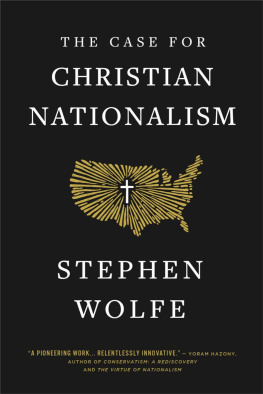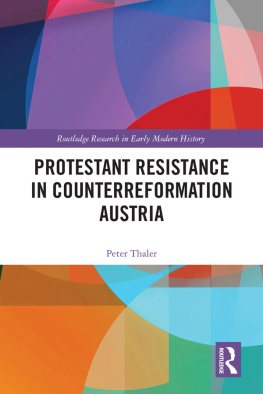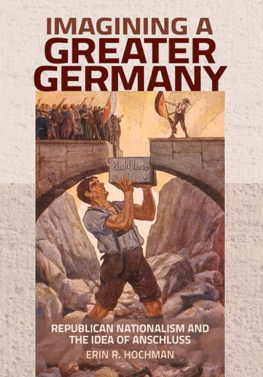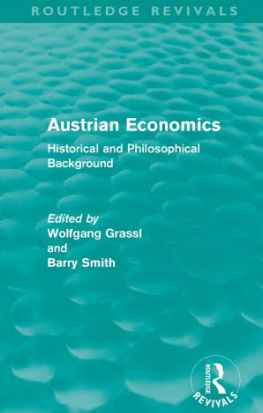NATIONALISM REVISITED
AUSTRIAN AND HABSBURG STUDIES
General Editor: Howard Louthan, Center for Austrian Studies, University of Minnesota
Before 1918, Austria and the Habsburg lands constituted an expansive multinational and multiethnic empire, the second largest state in Europe and a key site for cultural and intellectual developments across the continent. At the turn of the twentieth century, the region gave birth to modern psychology, philosophy, economics, and music, and since then has played an important mediating role between Western and Eastern Europe, today participating as a critical member of the European Union. The volumes in this series address specific themes and questions around the history, culture, politics, social, and economic experience of Austria, the Habsburg Empire, and its successor states in Central and Eastern Europe.
Recent volumes:
Volume 25
Nationalism Revisited: Austrian Social Closure from Romanticism to the Digital Age
Christian Karner
Volume 24
Entangled Entertainers: Jews and Popular Culture in Fin-de-Sicle Vienna
Klaus Hdl
Volume 23
Comical Modernity: Popular Humour and the Transformation of Urban Space in Late Nineteenth-Century Vienna
Heidi Hakkarainen
Volume 22
Embers of Empire: Continuity and Rupture in the Habsburg Successor States after 1918
Edited by Paul Miller and Claire Morelon
Volume 21
The Art of Resistance: Cultural Protest against the Austrian Far Right in the Early Twenty-First Century
Allyson Fiddler
Volume 20
The Monumental Nation: Magyar Nationalism and Symbolic Politics in Fin-de-sicle Hungary
Blint Varga
Volume 19
Tropics of Vienna: Colonial Utopias of the Habsburg Empire
Ulrich E. Bach
Volume 18
Sacrifice and Rebirth: The Legacy of the Last Habsburg War
Edited by Mark Cornwall and John Paul Newman
Volume 17
Understanding Multiculturalism: The Habsburg Central European Experience
Edited by Johannes Feichtinger and Gary B. Cohen
Volume 16
The Viennese Caf and Fin-de-Sicle Culture
Edited by Charlotte Ashby, Tag Gronberg, and Simon Shaw-Miller
For a full volume listing, please see the series page on our website: http://berghahnbooks.com/series/austrian-habsburg-studies.
NATIONALISM REVISITED
Austrian Social Closure from Romanticism to the Digital Age
Christian Karner
First published in 2020 by
Berghahn Books
www.berghahnbooks.com
2020 Christian Karner
All rights reserved. Except for the quotation of short passages for the purposes of criticism and review, no part of this book may be reproduced in any form or by any means, electronic or mechanical, including photocopying, recording, or any information storage and retrieval system now known or to be invented, without written permission of the publisher.
Library of Congress Cataloging-in-Publication Data
Names: Karner, Christian, author.
Title: Nationalism Revisited: Austrian Social Closure from Romanticism to the Digital Age / Christian Karner.
Description: New York: Berghahn, 2020. | Series: Austrian and Habsburg Studies; volume 25 | Includes bibliographical references and index.
Identifiers: LCCN 2019040130 (print) | LCCN 2019040131 (ebook) | ISBN 9781789204520 (hardback) | ISBN 9781789204537 (ebook)
Subjects: LCSH: NationalismAustriaHistory. | German languagePolitical aspectsHistory. | Habsburg, House of.
Classification: LCC DB47 .K247 2020 (print) | LCC DB47 (ebook) | DDC 320.5409437dc23
LC record available at https://lccn.loc.gov/2019040130
LC ebook record available at https://lccn.loc.gov/2019040131
British Library Cataloguing in Publication Data
A catalogue record for this book is available from the British Library
ISBN 978-1-78920-452-0 hardback
ISBN 978-1-78920-453-7 ebook
Acknowledgments

I t is stating the obvious to say that a book of this length and with such a prolonged period of gestation would never have seen the light of the day without the help of many, only some of whom I have space to explicitly thank here. Sources of vital support over the past decade and more have been provided by institutions and individuals. Starting with the former, thanks are due to my former colleagues at the University of Nottinghams School of Sociology and Social Policy for providing a supportive and stimulating intellectual environment, in which a pluralism of thematic interests, methodological approaches, and theoretical perspectives continues to thrive. Within my own area of specialism, the Center for Austrian Studies at the University of Minnesota and the Center Austria at the University of New Orleans provided me with temporary intellectual homes during two sabbaticals in 2015 and 2018 respectively. The hospitality, interest, and practical support provided both in Minneapolis and in Louisiana were inspiring, enormously helpful, and hugely appreciated. Special thanks are due to Gary Cohen, Howard Louthan, and Jennifer Hammer in Minneapolis, and to Gnter Bischof, Marc Landry, and Gertraud Griessner in New Orleans. As far as other individual companions are concerned, the following in particular have been a continuous source of friendship and inspiration over recent months and years: Meryl Aldridge, Giorgos Bithymitris, Zinovia Lialiouti, Marek Kazmierczak, Jos Lopez, Frdric Moulne, Laura Morowitz, Despina Papadimitriou, Aline Sierp, Bjrn Thomassen, and Bernhard Weicht. All I can hope is that I have been able to show them at least some of the kindness and help they have continually given me. My profound gratitude also extends to some who, sadly, are no longer with us. Though their thematic specialisms differed from my own, the late Alan Aldridge and the late Christopher Johnson each influenced me in important ways: Alan as a sociologist, Chris as a historian of ideaseach of them showed me and many others what their craft was capable of achieving. More importantly, they were both living proof that humility, generosity, and scholarly excellence can and indeed should go hand in hand. Their presence is sorely missed.
I would also like to acknowledge my sincere gratitude to long-term, though here unnamed, companions and friends, and to my cousin Sandra Schnabl, at home in Austria, whose presence and support both predated and continued throughout the years I spent working on this book. Further thanks are due to Chris Chappell, Soyolmaa Lkhagvadorj, and Elizabeth Martinez at Berghahn Books for all their support and for making the journey to publication as smooth as possible, and to three anonymous referees whose insightful comments helped me refine and sharpen the manuscript. Of course, responsibility for the contents and arguments contained in this book, particularly for its limitations, remains mine alone. My deepest debt of gratitude goes to my parents Christa and Peter Karner for all their practical and emotional helpall my life and on a daily basis they have been reminding me of what really mattersand, in Greece, to the Lekka family and in particular my in-laws Dimitris Lekkas and Aggeliki Vasili for showing me what I had known but never experiencedthat human beings can indeed have more than one home. Finally, words do not suffice to thank my wife .










